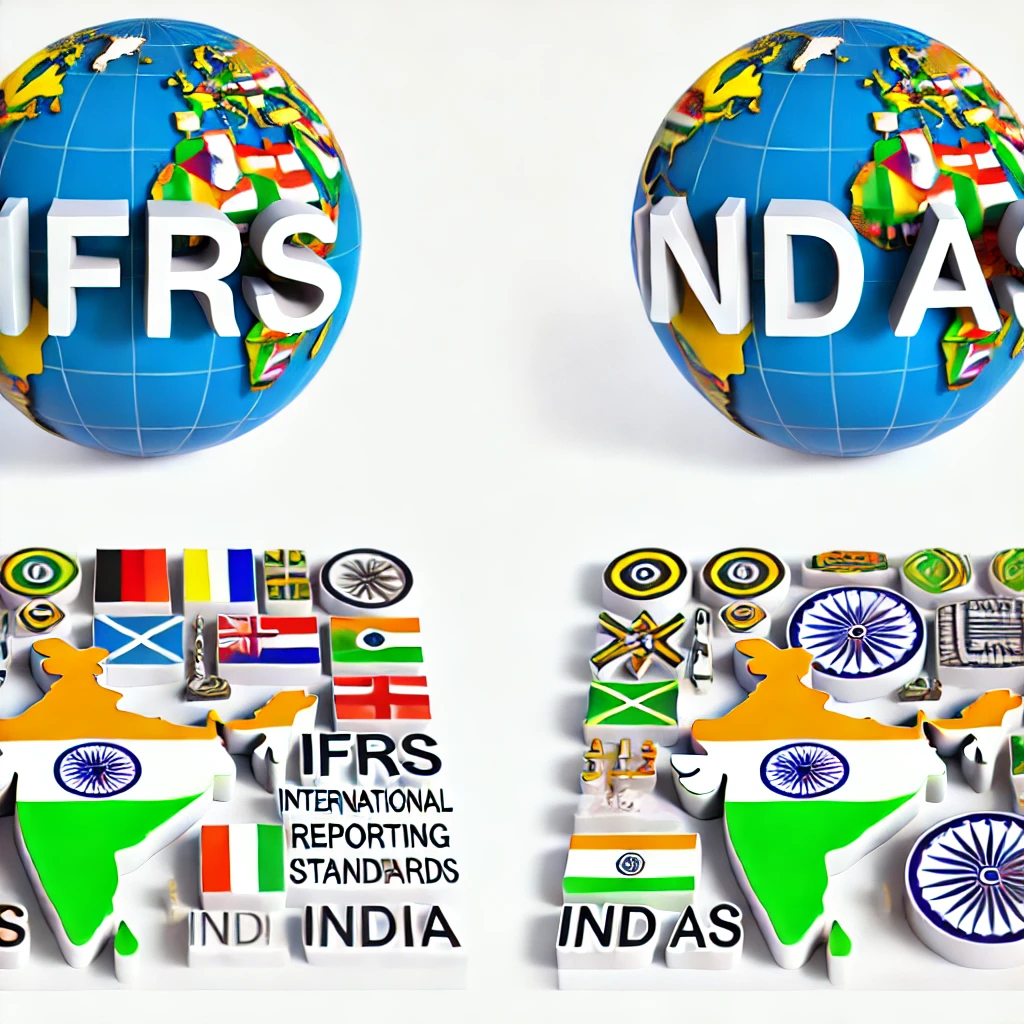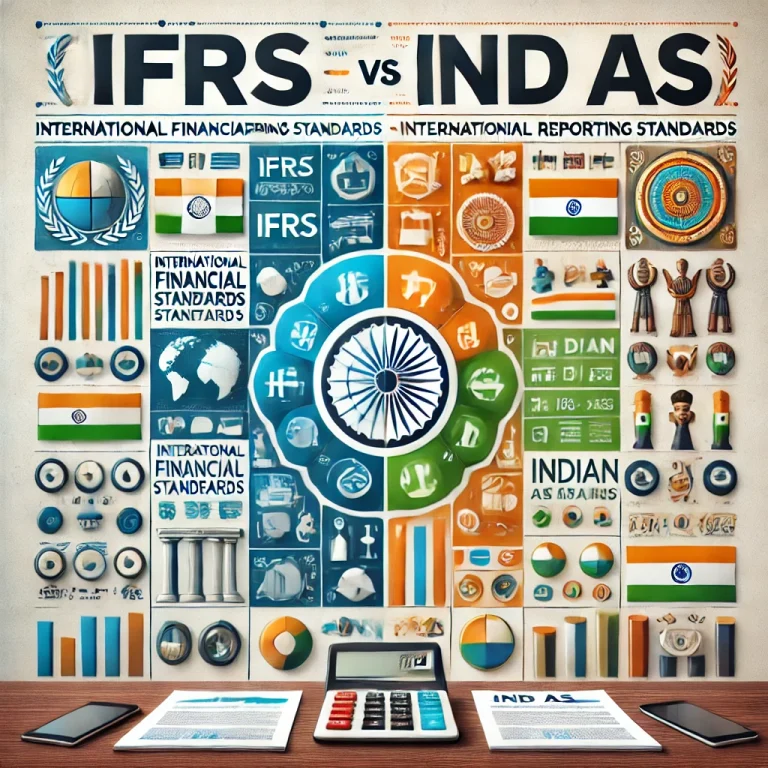Today, in the context of globalization, the distinction between IFRS and IND AS is important for businesses both in India and abroad. An increasing focus on transparency, comparability, and consistency requires knowing the distinction between International Financial Reporting Standards (IFRS) and Indian Accounting Standards (IND AS). Though both aim at standardizing financial reporting, they differ significantly in their approach, principles, and specific guidelines.
Difference between International Financial Reporting Standards and Indian Accounting Standards
International Financial Reporting Standards released by the International Accounting Standards Board represent the generally accepted accounting practices for international jurisdictions to seek convergence of financial reporting throughout the world. In the case of India, it is the IND AS (adapted IFRS) issued by the Ministry of Corporate Affairs (MCA) to meet the precise Indian economic, legal, and regulatory conditions. The convergence of Indian GAAP with IFRS would make the financial statements of Indian companies more comparable in the global context.
| Aspect | IFRS | IND AS |
|---|---|---|
| Issued by | International Accounting Standards Board (IASB) | Ministry of Corporate Affairs (MCA), India |
| Applicability | Global | Primarily India |
| Principle-based vs. Rule-based | Principle-based | Rule-based adaptation |
| Fair Value Measurement | Emphasizes fair value extensively | Moderated to fit the Indian economy |
| Revenue Recognition | IFRS 15 (5-step model) | Similar to IFRS 15, with minor modifications |
| Presentation of Financial Statements | More flexibility in format | Mandates specific formats under the Companies Act, 2013 |
IFRS offers a more principle-based approach with extensive fair value emphasis, while IND AS has modified these standards to align better with India’s legal and economic framework.
Understanding IND AS
IND AS is also known as Indian Accounting Standards in its simplest form. Indian Accounting Standards are, however, converged standards based on IFRS with modifications made to suit the requirements of India’s financial environment and regulations. Thus, consistency in Indian financial reporting makes Indian companies better placed for effective participation in international financial markets.
Principles, Rules, and Procedures in IND AS
- Principle-Based Approach: IND AS generally follows a principle-based approach to ensure that the financial information provided by companies is relevant, comparable, and reliable.
- Measurement: IND AS incorporates both fair value and historical cost accounting principles. However, it is more conservative in using fair value than IFRS, as Indian regulations often prioritize stability over volatility in financial reporting.
- Specific Guidance: IND AS provides detailed guidance for industries unique to India, such as agricultural and SME sectors, addressing India’s unique economic environment.
IND AS, therefore, ensures transparency and better governance in financial reporting. It supports stakeholders, including investors, in making well-informed decisions regarding Indian businesses operating within a global marketplace.

Importance of IND AS
IND AS plays a vital role in harmonizing Indian financial reporting with global practices. Here’s why IND AS is significant for businesses in India:
- Improved Global Comparability: IND AS allows better understanding and comparison of international peers of Indian companies, which otherwise may not make sense in the global community.
- Increased Credibility: IND AS increases the authenticity of the Indian financials, thus attracting more foreign investment into the country, as is being reported often.
- Regulatory Compliance: Many of the Indian regulatory agencies, including SEBI, require Indian companies to get their financial statements prepared along the lines of IND AS, ensuring compliance.
By improving transparency, IND AS helps foster trust and aligns Indian companies with global best practices.
IFRS Meaning
IFRS is the name of International Financial Reporting Standards which refers to those standards regarding the financial reporting that were devised by the International Accounting Standards Board. International Financial Reporting Standards has been interested in setting accounts of various nations straight, so companies’ statements of financial reports could compare one with others.
Importance of IFRS
IFRS holds substantial importance in today’s interconnected business world. Here’s why IFRS matters:
- Global Consistency: IFRS provides for the presentation of financial information by companies throughout the world in a unified manner, which benefits worldwide investors and regulators.
- Comparability and transparency: A universally accepted language for financial reporting, IFRS assists stakeholders in analyzing and comparing financial statements across jurisdictions and regions.
- Investor trust: Clear and comparable financial statements enhance investor trust and pave the way for cross-border investments.
- Lower Costs for Multinational Companies: IFRS enables multinational companies to simplify their accounting process, simplify complexity, and reduce associated costs associated with preparing multiple financial reports to meet diverse regulatory requirements.
IFRS simplifies and enhances global financial transparency, enabling businesses and investors to operate in a more harmonized financial environment.
Applicability of IFRS
IFRS is applicable in over 140 countries and is widely used by companies listed on global stock exchanges. In India, while IFRS is not directly adopted, it heavily influences IND AS. For companies operating across borders or seeking international investments, alignment with IFRS is often beneficial.
- Multinational Companies: IFRS is mandatory for entities that are listed on global exchanges or have international investors, promoting cross-border financial understanding.
- Indian Companies Abroad: Many Indian companies operating in foreign markets voluntarily align their reporting with IFRS to meet the expectations of international stakeholders.
- Future Convergence: There is ongoing convergence between IFRS and local standards, including IND AS, to further align Indian reporting with global best practices.
Key Differences Between IFRS and IND AS in India
- Revenue Recognition: Both IFRS and IND AS have revenue recognition principles similar to each other but with some differences in the Companies Act, 2013 under IND AS.
- Leases: The IND AS 116 largely follows IFRS 16 but with some exceptions about disclosures and measurements specifically tailored to the requirements of India.
- Financial Instruments: IFRS and IND AS both have the fair value measurement of financial instruments but with further guidance from IND AS to accommodate the peculiar financial structure of India.
Conclusion
The bases for IFRS and IND AS are quite comparable; however, the standards under each set vary, giving a flavor unique to a specific jurisdiction. The principles used, fair value measurement, and the regulatory adaptations applied set the difference between IFRS and IND AS. Since this process of adopting IND AS got Indian accounting closer to the international norms, then that has enabled cross-border investment and greater transparency within a firm. And they also have to keep up and adapt to those changes along with accountants, regulators, and investors as this Indian economy stretches globally.
IFRS and IND AS FAQs
What is the primary difference between IFRS and IND AS?
The primary difference between IFRS and IND AS lies in the regulatory adaptations of IND AS for the Indian economy, emphasizing stability and adherence to local requirements under the Companies Act, 2013.
Why is IND AS important for Indian companies?
IND AS is essential for aligning Indian financial reporting with global standards, increasing credibility, and attracting foreign investment.
Are IND AS and IFRS the same?
No, IND AS is India’s adapted version of IFRS, tailored to comply with Indian laws and economic conditions while following IFRS principles closely.
Who issues IFRS and IND AS?
IFRS is issued by the International Accounting Standards Board (IASB), while IND AS is issued by the Ministry of Corporate Affairs (MCA), India.
Is IFRS applicable to all Indian companies?
No, IFRS is not directly applicable in India. Instead, Indian companies use IND AS, which converges with IFRS, making Indian financial statements globally comparable.


